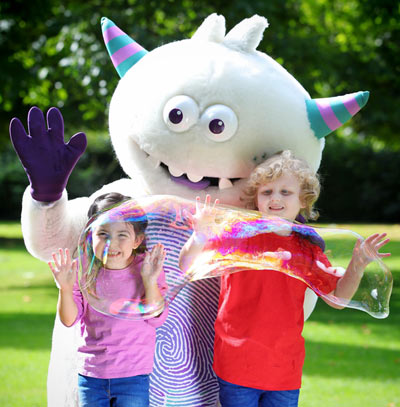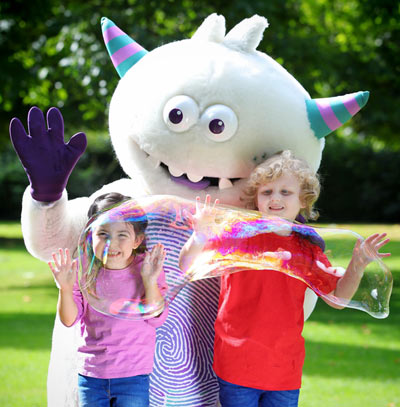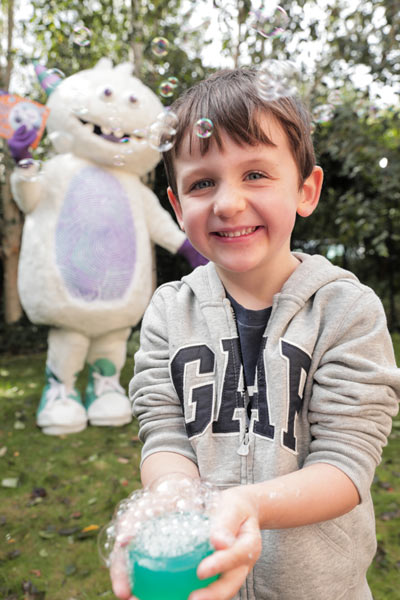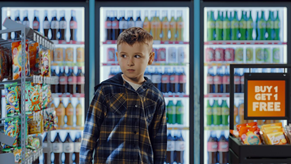Rufus the Handwashing Hero on hand to help children under five learn all about handwashing

safefood has turned to a big, friendly, furry monster to launch the latest phase of our Handwashing programme.
Tuesday 10 September, 2019. safefood has turned to a big, friendly, furry monster to launch the latest phase of our Handwashing programme, which aims to help make learning about good handwashing habits fun for under 5s and help keep bacteria like E.coli from spreading. Person-to-person spread remains one of the most common transmission routes for E.coli infections.
 “Rufus the Handwashing Hero” is the star of a new free educational resource pack featuring a storybook, sink poster and sticker set. Developed by safefood with the support of Early Childhood Ireland, the pack has been arriving in more than 3,500 childcare providers since last week.
“Rufus the Handwashing Hero” is the star of a new free educational resource pack featuring a storybook, sink poster and sticker set. Developed by safefood with the support of Early Childhood Ireland, the pack has been arriving in more than 3,500 childcare providers since last week.
Speaking today, Dr Linda Gordon, Chief Specialist in Food Science, safefood said
[quote=]As we know, person-to-person spread remains one of the most common transmission routes for E.coli infections. Teaching young kids how but also when to wash their hands and reinforcing that behaviour in a fun, engaging way is a great way to help protect them.[/quote]
 Ray Dolan, Chief Executive, safefood continued: “Handwashing is one of the most important life skills we can teach children from a young age. ‘Rufus’ is a fun, friendly character with a big personality that we’ve created to teach kids about handwashing. We are providing childcare and education professionals with our storybook, catchy song and our easy-to-remember five steps of handwashing – Wet; Soap; Rub; Rinse and Dry as part of our pre-school pack. Our pack contains extra reusable posters for home, so children can bring these lessons home and wash their hands with Rufus and their parents too.”
Ray Dolan, Chief Executive, safefood continued: “Handwashing is one of the most important life skills we can teach children from a young age. ‘Rufus’ is a fun, friendly character with a big personality that we’ve created to teach kids about handwashing. We are providing childcare and education professionals with our storybook, catchy song and our easy-to-remember five steps of handwashing – Wet; Soap; Rub; Rinse and Dry as part of our pre-school pack. Our pack contains extra reusable posters for home, so children can bring these lessons home and wash their hands with Rufus and their parents too.”
“We know from our own research that the vast majority of childcare professionals are aware of the risks of harmful bacteria like E.coli. Handwashing is one of the best ways to stay safe, reduce the chances of spreading this bacteria and prevent food-poisoning. Using this great resource will help them maintain this high level of awareness while teaching this lifelong skill to the children in their care.”
Commenting, Teresa Heeney, Chief Executive, Early Childhood Ireland added: “We’re delighted to have worked with safefood in the development of this fun resource pack. The sink posters and songs help with learning good handwashing habits and the storybook helps to reinforce this in a very interactive way with each child. Our members understand that as childcare professionals, they play a key role in developing these life skills and reducing the risk of harmful bacteria like E.coli spreading among the children in their care”.
For more information on the campaign and resources for childcare providers, visit www.safefood.eu.
- Ends -
Editor’s notes
From 2010-2016, there were 541 outbreaks of VTEC (verocytotoxigenic E. coli) in the Republic of Ireland. Of those, 43 outbreaks were associated with childcare settings during that same period. In 2017 there were 923 cases of VTEC (E Coli) of which 361 (39%) were in children aged 0-4. Source: Health Protection Surveillance Centre.
For further information please contact:
Zara Brownless, Wilson Hartnell
Tel: +353 1 669 0259
Mob: +353 083 301 2442
Email: [email protected]
OR Dermot Moriarty, safefood
Tel: +353 1 448 0600
Mob: +353 86 381 1034
Email: [email protected]
What is E.coli?
Escherichia coli (or E.coli for short) is a large group of bacteria, of which many of which are harmless and occur naturally in the gut of humans and animals. One strain, VTEC while it poses no risk to cattle, can cause a serious disease in humans. Those most at risk are the very young, pregnant women, the elderly and people with an already weakened immune system. The infection can be passed from person-to person, through consuming contaminated food or water; or contact with infected animals; contamination in the environment; or through inadequate hygiene and handwashing habits.




